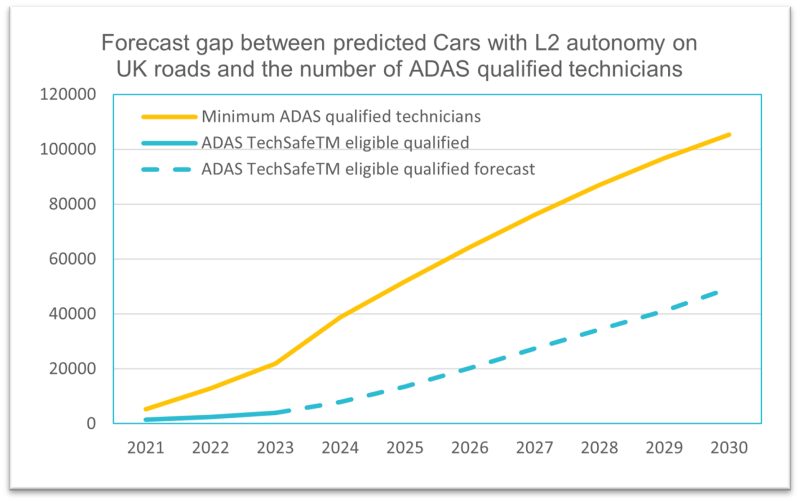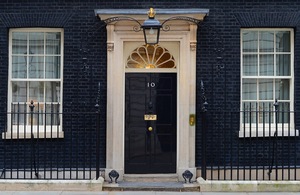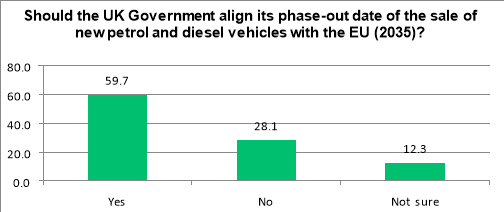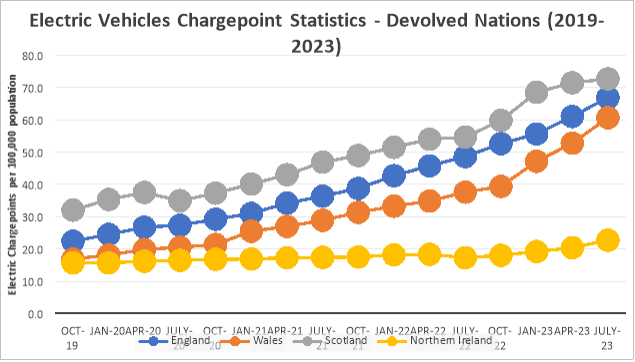
50,000 public EV chargepoints installed in UK – DfT
The UK’s Department for Transport has hailed “another step on the road to zero emission driving” with new statistics showing that 52,602 public chargepoints have been installed across the country. This figure, supplied by Zapmap, represent a 44 per cent increase on the equivalent number at this time in 2022. The DfT added that the statistic shows the country is “on track” to reach its target of 300,000 public chargepoints by 2030.
Continue Reading
44% of dealers think car buyers will stick with petrol, diesel for longer after UK government’s EV decision
More than four out of 10 dealers (44 per cent) think used car buyers will stick with petrol and diesel cars for longer following the government’s decision to delay the new car electrifcation deadline to 2035. Startline’s November Used Car Tracker also shows that 29 per cent believe the move will mean the used electric vehicle (EV) market will take longer to develop while 19 per cent forecast that consumer demand for EVs will fall. Additionally, 24 per cent of dealers now believe it is more likely that motorists will buy a hybrid as a stepping stone to full electrification while 20 per cent believe that EV prices will fall further in addition to recent reductions.
Continue Reading
Repairify: technology, AI can help bridge ADAS servicing skills gap
Garage and diagnostics equipment supplier Repairify has addressed the current chasm between the approximately 3,500 ADAS-qualified technicians in the UK and the 21,500 required to meet market demand for these services. The company says it can help businesses meet the dramatic increase in demand, set to continue as growth in ADAS-equipped vehicles rises, via the support of its own team of IMI-qualified technicians and the development of technology to support maintenance work on these cars. Phil Peace, managing director (SVP) international at Repairify Inc, told Tyres & Accessories that AI and machine learning has enabled the company to enhance its data to support its solutions that puts critical repair information into garage workflow.
Continue Reading
IMI: ‘profound economic repercussions’ ahead if ADAS technician skill shortage not addressed
Electric vehicles dominated discussions about future mobility in 2023, but the latest data from the Institute of the Motor Industry (IMI) suggests that a more urgent issue has been neglected in the rush to promote EVs. The latest IMI TechSafe Technician Forecasts data identifies what the institute calls a “dangerous shortfall” in technicians able to work safely and competently on vehicles equipped with Advanced Driver Assistance Systems (ADAS), with approximately 18,000 extra ADAS-qualified technicians required to meet demand.
Continue Reading
ETRMA supports Euro 7 tyre abrasion progress
The European Tyre and Rubber Manufacturers’ Association (ETRMA) has welcomed the European Parliament Plenary vote on 10 November and the “progress made towards delivering meaningful tyre abrasion limits under the auspices of Euro 7”.
Continue Reading
TyreSafe chair Stuart Lovatt featured on Driving for Better Business podcast
TyreSafe chair, Stuart Lovatt, has appeared on two episodes of the Driving for Better Business podcast. Lovatt provided a range of tyre safety insights, covering first the impact of tyre safety on fleet managers, and secondly a look at company cars and grey fleet, with tyres for electric vehicles, part-worn tyres and October’s Tyre Safety Month all discussed. Lovatt gave tips on mitigating risk, saving money and staying safe when driving for work. Both episodes are embedded below, or you can access them on the Driving for Better Business website and via various podcast platforms.
Continue Reading
DfT announces plans for red flashing lamps for roadside recovery, NTDA ‘delighted’
The Department for Transport (DfT) has announced plans to allow rear-facing red flashing lamps in order to make road-side recovery safer. As part of its ‘Plan for Drivers’, the government department said it would be: “Permitting red flashing lights for breakdown vehicles, helping to protect recovery drivers by making them more visible at the roadside”, adding: “This measure will apply to England, Scotland, and Wales.”
Continue Reading
Rishi Sunak downplays EV delay by setting “path to zero emission vehicles by 2035”
Just a week after pushing back the deadline for transitioning to electric vehicles to 2035, the government has set out the percentage of new zero emission cars manufacturers will be required to produce each year up to 2030. The zero emission vehicle mandate requires 80% of new cars and 70% of new vans sold in Great Britain to be zero emission by 2030, increasing to 100% by 2035. The 2035 end of sale date puts the UK in line with other major global economies, including France, Germany, Sweden and Canada.
Continue Reading
Half of drivers say government policy means they won’t buy EVs before 2035
In the week prior to Rishi Sunak’s announcement that the ICE ban would be pushed back from 2030 to 2035, 42 per cent of drivers planning to buy a new car said they expected it to be a low-emissions vehicle (either fully electric or hybrid), according to research carried out for Kwik Fit. However, following the announcement, Kwik Fit’s researchers found that the proportion planning to opt for a low-emissions vehicle has now dropped back to 38 per cent. The figures indicate that the number of car buyers planning to choose an EV or hybrid has dropped by more than two million since the ban has moved from 2030 to 2035.
Continue Reading
Auto industry bodies react as UK extends deadline for ICE ban
‘Furore’, ‘about turn’, ‘climb down’ – all of these expressions have been levelled at the UK Government on release of the news that the much-vaunted and well-publicised deadline for the ban on sales of new petrol and diesel internal combustion engine, (or ICE) vehicles has been put back five years, from 2030 to 2035. On the other hand, the news has also been described as ‘sensible’, ‘pragmatic’ and ‘more transparent’, so which stance is the correct one? And what are the reasons behind the change in attitude, and what are the reactions of the various players in the automotive sector? A press release issued from 10 Downing Street says that: “Under revised plans, the Government will move back the ban on the sale of new petrol and diesel cars by five years, so all sales of new cars from 2035 will be zero emission. This will enable families to wait to take advantage of falling prices over the coming decade if they wish to.” Prime Minister Rishi Sunak acknowledged that the going could be tough, saying: “There will be resistance – and we will meet it. Because I am determined to change our country and build a better future for our children. Nothing less is acceptable.” Following a mixed reaction from the NFDA, other automotive industry associations have added their opinions to the move.
Continue Reading
Government EV commitment climbdown could create confusion but has dealer support – NFDA
On Wednesday, 20 September 2023, the UK government announced that the ban on sales of new petrol and diesel cars and vans by 2030 has been pushed back to 2035. The National Franchised Dealers Association surveyed its members on this issue in August 2023; 60 per cent of respondents supported an alignment with the European Union, emphasising a lack of confidence in the Governments current plan to deliver the necessary support the industry needs in achieving the 2030 deadline.
Continue Reading
Study across Scottish Borders shows 20mph speed limit a success
A study by Edinburgh Napier University has shown that the rollout of 20mph speed limits across the Scottish Borders has reduced average speeds by 3mph. With previous research showing that there is an average 4 per cent reduction in collisions with each 1mph reduction in average speed on rural roads, the study demonstrates the significant knock-on effect the new speed limit is likely to have, particularly when seen within the context of the national Road Safety Framework to reduce deaths and serious injuries to zero by 2050.
Continue Reading
Government Support for Phase-Out Dates: NFDA Members’ Survey Highlights Urgent Need
On Friday 15 September, the NFDA responded to the House of Lords Environment and Climate Change Committee’s Electric Vehicle Call for Evidence which aims to better understand how the Government will achieve its upcoming 2030 and 2035 deadlines for the phase-out of non-zero emission vehicles and to understand the costs/benefits associated with the 2030 phase-out date.
Continue Reading
TyreSafe presents new partnerships, launches Tyre Safety Month campaign materials
TyreSafe has held its annual briefing with a slick online presentation designed to demonstrate its direction under a new chair. Presenting contributions from a veritable rollcall of regional and national road safety and risk management stakeholders, chair Stuart Lovatt and TyreSafe manager Jason Simms detailed the last 12 months of TyreSafe’s activities, which have included a tyre safety demonstration day at Mira, the development of new and existing partnerships with road safety organisations such as National Highways, the Parliamentary Advisory Council for Transport Safety (PACTS), Roadsafe, and several fire and police service representatives, and a range of events in local communities around the country. Lovatt explained how TyreSafe’s work is of crucial importance to the Safe System Approach, the widely accepted strategy on reducing the number of fatalities, casualties and incidents on Britain’s roads. Emma Burley, Tyresafe communications lead, also introduced the 2023 Tyre Safety Month Campaign, ‘Be Safe and Save’, indicating another way in which TyreSafe is tweaking its approach in 2023. The campaign emphasises how maintaining the good condition of tyres fitted to cars also reduce costs to motorists, a tyre safety message designed to resonate deeply in the cost-of-living crisis. TyreSafe also unveiled its latest national tread depth survey, conducted with the assistance of members at the point of replacement. Before launching into the briefing, Lovatt and Simms also paid tribute to previous chair Stuart Jackson, who stepped down after 14 years at the helm last year, prior to Lovatt’s election.
Continue Reading
Shandong relaxes restrictions on new high-end tyre projects
On 17 August 2023, several government departments in Shandong Province, China jointly issued a notice relaxing regulations for establishing high-end tyre projects. A more detailed explanation is that some new tyre manufacturing projects will no longer need to eliminate the original production lines with the same energy consumption.
Continue Reading

